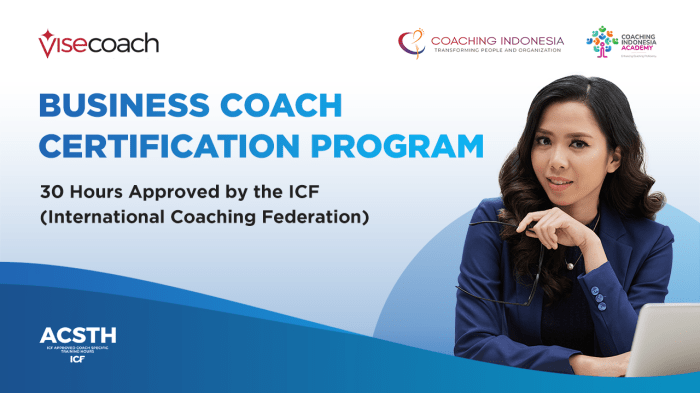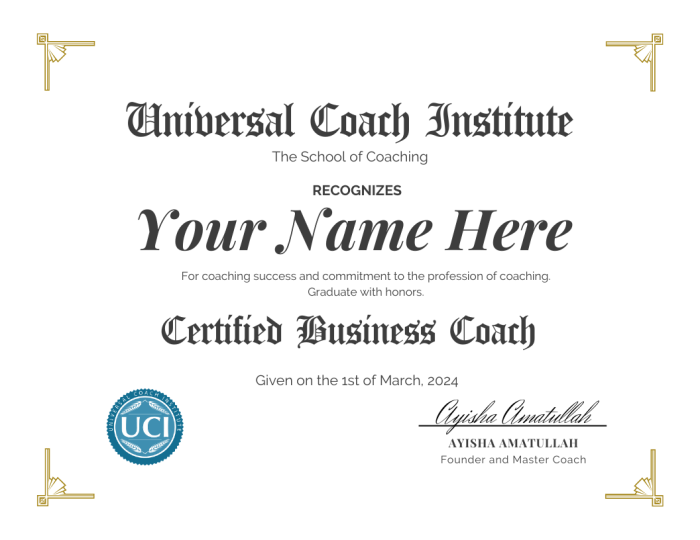
Navigating the complex world of business can be challenging, and the right guidance can be invaluable. This guide delves into the intricacies of business coaching certification, exploring its various forms, benefits, and future implications. We’ll examine different certification programs, comparing their curricula, costs, and accreditation standards, ultimately providing a clearer picture of how this certification can elevate your career and impact your clients’ success.
From understanding the distinctions between business coaching and related fields to analyzing successful case studies, we aim to provide a comprehensive overview for aspiring coaches and those seeking to enhance their professional development. We will also consider the ethical considerations and the evolving role of technology within the field, painting a holistic view of the business coaching landscape.
Defining Business Coaching Certification
Business coaching certification signifies a formal recognition of an individual’s competency in providing business coaching services. It validates their knowledge, skills, and experience, enhancing credibility and client trust. The process involves completing a structured program and often meeting specific criteria, leading to a credential that demonstrates professional proficiency.
Types of Business Coaching Certifications
Various certifications cater to different coaching niches and experience levels. Some focus on specific business areas, such as sales coaching or leadership coaching, while others offer a more general business coaching approach. Certifications might also vary in their emphasis on specific methodologies or theoretical frameworks. For example, some programs may heavily emphasize behavioral coaching models, while others might integrate neuroscience or positive psychology principles.
The level of specialization offered greatly influences the scope of practice a certified coach can claim.
Curriculum Components of a Business Coaching Certification Program
A typical business coaching certification program comprises several key components. These usually include foundational modules covering coaching ethics, legal and professional standards, and the core principles of effective coaching. The curriculum also delves into coaching methodologies, assessment tools, and communication techniques. Many programs incorporate practical elements such as role-playing exercises, supervised coaching sessions, and case studies to build real-world skills.
Additionally, business acumen and strategic thinking are often significant components, equipping coaches to effectively guide clients in complex business scenarios.
Comparison of Certification Bodies and Accreditation Standards
Different certification bodies adhere to varying accreditation standards, impacting the recognition and perceived value of their certifications. Some organizations are internationally recognized and highly regarded within the coaching industry, while others may operate regionally or have less stringent accreditation processes. Accreditation standards often cover areas such as curriculum rigor, instructor qualifications, ethical guidelines, and continuing education requirements. The choice of certification body should consider the specific needs and career goals of the aspiring coach, as well as the level of recognition and credibility sought.
Reputable organizations typically maintain clear standards and offer robust support to their certified coaches.
Comparison of Business Coaching Certification Programs
The following table compares four hypothetical business coaching certification programs. Note that actual program details and costs can vary significantly depending on the provider and specific program offerings. This table serves as a comparative example and should not be considered exhaustive or definitive.
| Program Name | Cost (USD) | Duration | Prerequisites |
|---|---|---|---|
| Global Coaching Institute | $5000 | 6 months | Bachelor’s degree |
International Coaching Federation (ICF)
|
Varies by provider | Varies by provider | Coaching experience and training hours |
| Center for Credentialing & Education (CCE) | $3000 | 9 months | None |
| Strategic Coaching Academy | $4000 | 12 months | Some business experience preferred |
Business Coaching Certification and Related Fields

Business coaching certification provides a structured framework for developing the skills and knowledge necessary to effectively guide individuals and businesses toward achieving their goals. However, understanding its relationship to other business disciplines is crucial for effective application and career development. This section explores the overlaps and distinctions between business coaching and related fields, ethical considerations, and the practical implications of integrating coaching into various business contexts.
Overlaps and Distinctions Between Business Coaching and Business Development
Business coaching and business development share the common goal of improving a business’s performance. However, they approach this goal from different perspectives. Business development focuses on strategic planning, market analysis, and operational improvements, often involving external factors like market trends and competitive landscapes. Business coaching, on the other hand, concentrates on the internal aspects, primarily working with the business owner or key personnel to enhance their leadership, decision-making, and overall effectiveness.
While business development might suggest implementing a new sales strategy, business coaching would focus on empowering the sales team to execute that strategy effectively. The synergy between the two is powerful; effective business development strategies are often more successfully implemented with the support of skilled business coaching.
Ethical Considerations in Business Coaching Compared to Other Business Fields
Ethical considerations in business coaching are paramount, mirroring but also exceeding those in other business fields. Maintaining client confidentiality, avoiding conflicts of interest, and ensuring competence are fundamental. Unlike some other business fields where the focus might primarily be on profit maximization, business coaching places a strong emphasis on the client’s well-being and long-term success, even if it means temporarily sacrificing short-term gains.
For example, a business coach might advise a client against a financially lucrative but ethically questionable deal, a decision that would differ from the pure profit-driven approach of some other business roles. The fiduciary duty in business coaching is particularly strong, requiring a high level of transparency and integrity.
The Role of Business Coaching in Supporting Business Development Strategies
Business coaching plays a vital role in translating business development strategies into actionable steps. For instance, if a business development plan calls for increased market share, a business coach can work with the sales team to improve their sales techniques, build confidence, and overcome limiting beliefs. The coach can also help the business owner to delegate effectively, manage stress related to implementing the new strategy, and maintain focus on the long-term vision.
Essentially, the coach acts as a catalyst, helping the business owner and their team navigate the challenges and maximize the opportunities presented by the development strategy.
The Impact of Business Loans on the Need for Coaching and Vice Versa
Securing a business loan often necessitates a robust business plan and demonstrable leadership capacity. Business coaching can significantly improve a business’s chances of loan approval by helping the owner develop a strong plan, refine their presentation skills, and demonstrate their commitment to success. Conversely, the influx of capital from a loan can create new challenges requiring coaching support. Managing increased resources, scaling operations, and navigating the pressures of growth are areas where coaching can prove invaluable.
For example, a sudden increase in revenue might necessitate hiring and team management training, an area where a business coach can provide significant support.
A Hypothetical Business Model Incorporating Business Coaching Services
Imagine a consulting firm specializing in sustainable business practices. This firm could offer a combined service package: first, a business development assessment focusing on environmental, social, and governance (ESG) factors, followed by tailored business coaching for the management team to implement the recommended changes. This model leverages both the strategic planning aspect of business development and the personal development focus of business coaching, offering a holistic approach to improving business performance while adhering to sustainable principles.
The revenue stream would be generated through tiered packages, offering varying levels of consulting and coaching services based on client needs and business size.
Comparison of Business Strategies Used by Businesses with and Without Coaching
Businesses that utilize coaching often exhibit a more proactive and adaptable approach to strategy. They tend to focus on continuous improvement, employee development, and long-term vision. Conversely, businesses without coaching might rely more on reactive strategies, focusing on immediate problems rather than proactive planning and often experiencing higher employee turnover. While this is a generalization, the data often shows that businesses investing in coaching tend to have higher employee retention rates and a more resilient approach to market changes.
The use of data-driven decision-making is also more prevalent in coached businesses.
Challenges of Integrating Business Travel into a Business Coaching Schedule
Integrating business travel into a business coaching schedule requires careful planning and flexibility. The coach and client need to establish clear communication channels to maintain consistency, perhaps using technology like video conferencing for sessions during travel. Time zone differences and unpredictable travel delays can disrupt the schedule, necessitating built-in flexibility and alternative scheduling options. Furthermore, maintaining a balance between travel demands and the coaching relationship requires clear boundaries and open communication to ensure the coaching process remains effective despite logistical challenges.
The Future of Business Coaching Certification

The business coaching landscape is dynamic, constantly evolving to meet the changing needs of businesses and individuals. Predicting the future with certainty is impossible, but analyzing current trends allows us to anticipate likely developments in business coaching certifications and their impact on the industry. Several key factors will shape this evolution, including technological advancements, shifting market demands, and the increasing professionalization of the coaching field.The increasing sophistication of business challenges necessitates a more specialized and nuanced approach to coaching.
This will directly influence the future of business coaching certifications.
Technological Advancements in Business Coaching Certification Programs
Technology will significantly impact how business coaching certifications are delivered and experienced. We can expect to see a rise in online and blended learning models, offering greater accessibility and flexibility for aspiring coaches. Artificial intelligence (AI) could personalize learning pathways, providing customized feedback and assessments based on individual learning styles and progress. Virtual reality (VR) and augmented reality (AR) technologies may also be incorporated to create immersive and engaging learning experiences, simulating real-world coaching scenarios.
For example, a VR module might simulate a difficult client interaction, allowing trainees to practice their skills in a safe environment before encountering similar situations in practice. Furthermore, AI-powered tools could automate administrative tasks, freeing up instructors to focus on providing more personalized mentorship and support.
Shifting Demand for Various Types of Business Coaching Certifications
Demand for specialized coaching certifications will likely increase. As businesses face increasingly complex challenges, the need for coaches with expertise in specific areas—such as leadership development, digital transformation, or sustainability—will grow. We might see a rise in niche certifications focusing on specific industries or business functions. For instance, a certification focusing on coaching executives in the renewable energy sector could become highly sought after, mirroring the current high demand for expertise in this rapidly growing field.
Conversely, certifications focusing on more generalized business coaching might see a decrease in relative demand as the industry moves towards greater specialization.
A Hypothetical Future Scenario for the Business Coaching Industry
Imagine the year 2030. Business coaching certifications are highly regulated and standardized, ensuring a consistent level of quality and competence across the industry. AI-powered platforms provide personalized learning experiences, adapting to individual learning styles and paces. Coaches leverage virtual and augmented reality tools to conduct simulations and practice real-world scenarios, enhancing their skills and effectiveness. The demand for specialized coaching certifications, such as those focused on sustainable business practices or navigating the metaverse, is high.
Coaching has become an integral part of organizational development strategies, with companies actively investing in coaching programs to enhance employee performance and foster a culture of continuous improvement. Successful coaches are not only highly skilled in their chosen specializations but also adept at leveraging technology to enhance their coaching practices and connect with clients globally. The field is highly competitive, yet those with specialized certifications and a commitment to ongoing professional development thrive.
Illustrative Examples of Successful Business Coaching
Business coaching, when effectively implemented, can dramatically improve a company’s trajectory. The following case studies illustrate the transformative power of skilled coaching interventions across various business contexts, demonstrating tangible results and showcasing the strategic approaches used.
Case Study 1: Revitalizing a Struggling Retail Business
A small, family-owned bookstore was facing closure due to declining sales and increased competition from online retailers. The owner, overwhelmed and lacking a clear strategic direction, engaged a business coach. The coach began by conducting a thorough assessment of the business, identifying weaknesses in inventory management, marketing, and customer engagement. Strategies implemented included a shift towards curated inventory focusing on niche genres, the development of a robust social media presence showcasing author events and community engagement, and the implementation of a loyalty program to retain existing customers.
Within a year, the bookstore experienced a 25% increase in sales and a significant improvement in customer loyalty. The coach’s role extended beyond tactical advice; they provided crucial emotional support and helped the owner develop a more confident and decisive leadership style.
Case Study 2: Accelerated Growth for a Tech Startup
A tech startup, developing innovative software for project management, had secured seed funding but struggled to scale effectively. The founders, while technically proficient, lacked experience in business development and marketing. A business coach was brought in to help refine their business model and develop a comprehensive go-to-market strategy. The coach guided the team through a process of market research, competitive analysis, and value proposition refinement.
They also facilitated the development of a clear sales pipeline and marketing plan, focusing on digital marketing channels and strategic partnerships. As a result, the startup secured several key clients, increased revenue by 70% within 18 months, and attracted further investment. The coach’s contribution was pivotal in establishing a sustainable business framework and ensuring the company’s long-term viability.
Case Study 3: Improving Operational Efficiency in a Manufacturing Company
A medium-sized manufacturing company experienced consistent production delays and high overhead costs. A business coach was hired to address these operational inefficiencies. The coach worked with the management team to implement Lean manufacturing principles, focusing on streamlining processes, reducing waste, and improving workflow. This involved mapping out existing processes, identifying bottlenecks, and implementing solutions to optimize efficiency. The coach also facilitated team-building exercises to improve communication and collaboration among employees.
Within six months, the company saw a 15% reduction in production time, a 10% decrease in overhead costs, and a significant improvement in employee morale. The coach’s expertise in process improvement and team dynamics was key to achieving these positive outcomes.
Business Coaching and Financial Crisis Intervention for a Small Business
A small bakery faced a severe financial crisis due to unexpected increases in ingredient costs and decreased customer traffic. A business coach helped by analyzing the bakery’s financial statements, identifying cost-cutting measures, and developing a revised pricing strategy. The coach also worked with the owner to explore alternative revenue streams, such as offering catering services or expanding product offerings.
Through a combination of financial restructuring, cost optimization, and innovative solutions, the bakery was able to navigate the crisis and regain financial stability. The coach’s guidance was instrumental in preventing business closure and ensuring the long-term survival of the enterprise.
Developing a Robust Business Model for a Startup Company
A startup developing a new type of sustainable packaging material lacked a clear business model. A business coach guided the founders through a process of defining their target market, identifying their value proposition, and developing a revenue model. The coach also helped them to create a detailed financial projection and secure funding. The result was a well-defined business model that clearly articulated the company’s value proposition, target market, and revenue streams, enabling the company to attract investors and launch its product successfully.
The coach’s structured approach helped transform a vague concept into a viable business plan.
Ultimately, achieving business coaching certification represents a significant investment in professional growth. By understanding the diverse pathways available, weighing the benefits against the costs, and anticipating future trends, individuals can make informed decisions that align with their career aspirations and contribute to a more effective and impactful coaching practice. The detailed analysis provided here serves as a foundation for navigating this dynamic field and achieving lasting success.
FAQ Guide
What is the average salary for a certified business coach?
Salaries vary greatly depending on experience, location, and specialization. However, certified coaches often command higher fees than uncertified coaches.
Are there continuing education requirements after certification?
Many certifying bodies require continuing education credits to maintain certification. This ensures coaches stay updated on best practices and industry trends.
How long does it take to complete a business coaching certification program?
Program lengths vary, ranging from a few months to over a year, depending on the intensity and curriculum.
What types of clients do certified business coaches typically work with?
Certified business coaches work with a diverse clientele, including entrepreneurs, executives, small business owners, and corporate teams.






